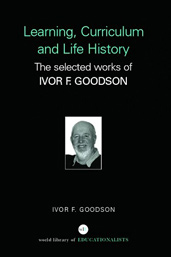Learning, Curriculum and Life Politics: the selected works of Ivor F. Goodson
Nations at Risk
John MacGregor, appointed by Prime Minister Thatcher as the Secretary of State for Education and Science, was clear therefore where the Government's priorities lay. Certainly the revival of UK history seems unrelated to any strong desires among history teachers themselves, where many disagreements have been voiced. These disagreements have even been voiced inside the select curriculum working group: 'At the heart of these disagreements on historical knowledge, British history and chronology, is the lingering fear among some numbers of the group particularly those who are teachers or educationists that the history curriculum will be dominated by rigid external testing and rote learning of famous dates in British history' (Times Educational Supplement).
National Curriculum and Social Prioritizing
The styling of the curriculum as 'national' begs a number of questions about which nation is being referred to, for the UK is a nation sharply divided by social class, by race, by gender, by region and by country. One of the short hands for Conservative criticism of what the French Prime Minister has called the UK government's 'social cruelty' has been a reference to the danger of creating 'two nations'. This refers to the UK phenomenon of there being two recognizably different constituencies or nations inside the UK's borders: one nation which is richer and more secure and often resides in the so-called 'Home Counties' of southern England, and the other nation which is less well-endowed, primarily working class, and lives in that 'other country' beyond southern England. In truth, of course, the UK comprises a range of communities, segmented by class, race, gender, region and country; there are in fact far more than two nations.
Hence, in examining the national curriculum as a social construction, it is important to establish whether the different groups which comprise 'the nation' are being treated equally, or whether processes of social prioritizing can be discerned. In this section, by way of exemplification, I focus mainly on the issue of social class but work urgently needs to be undertaken around issues of race, gender, region and country. In each of these cases the construction of particular priorities and the simultaneous silencing of multiple other claims needs to be painstakingly examined.
The pattern of secondary schooling has a long history but a crucial watershed was the 1902 Education Act and the subsequent issue of the Secondary Regulations in 1904. At the turn of the century a number of alternative versions of secondary schooling were vying with each other. The well-established public schools and grammar schools carried the highest status and catered for the more elite social groups through a traditional classical curriculum, but increasingly the school boards administering local schools were providing education for secondary age pupils. In these schools a more vocational curriculum, covering commercial, technical and scientific subjects, were provided for a predominantly working class clientele.
